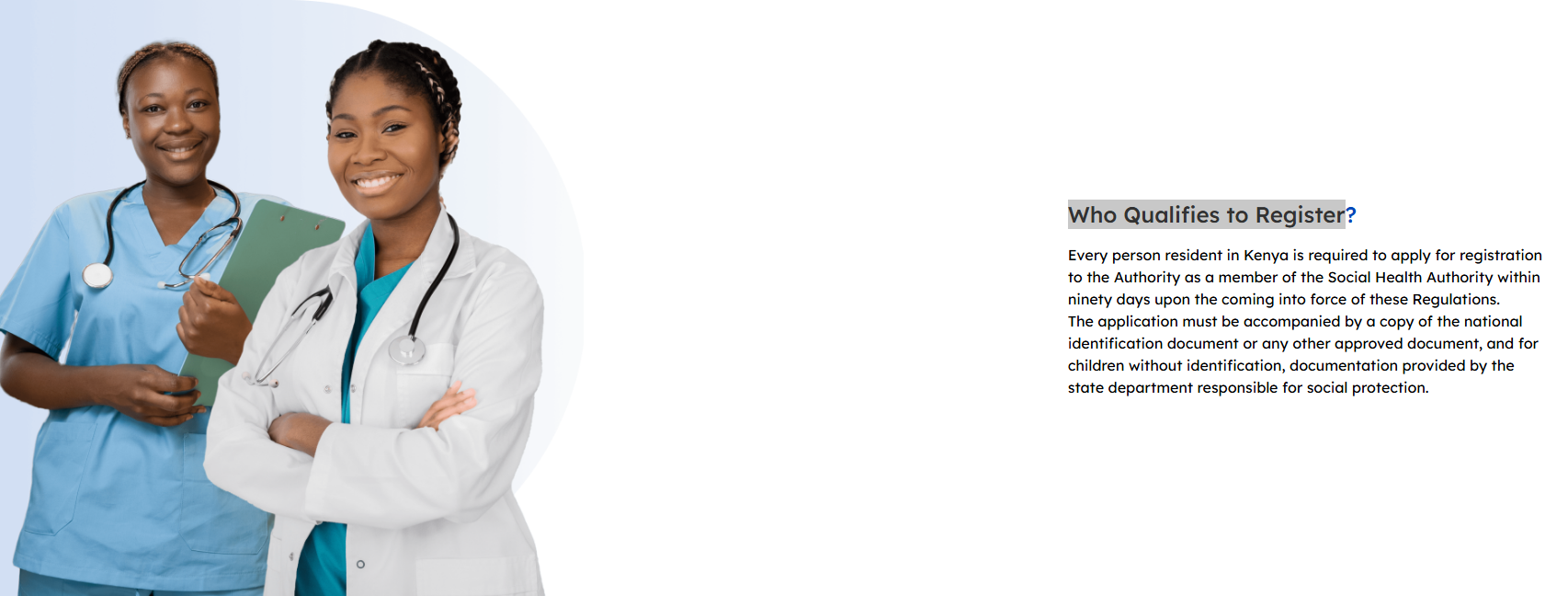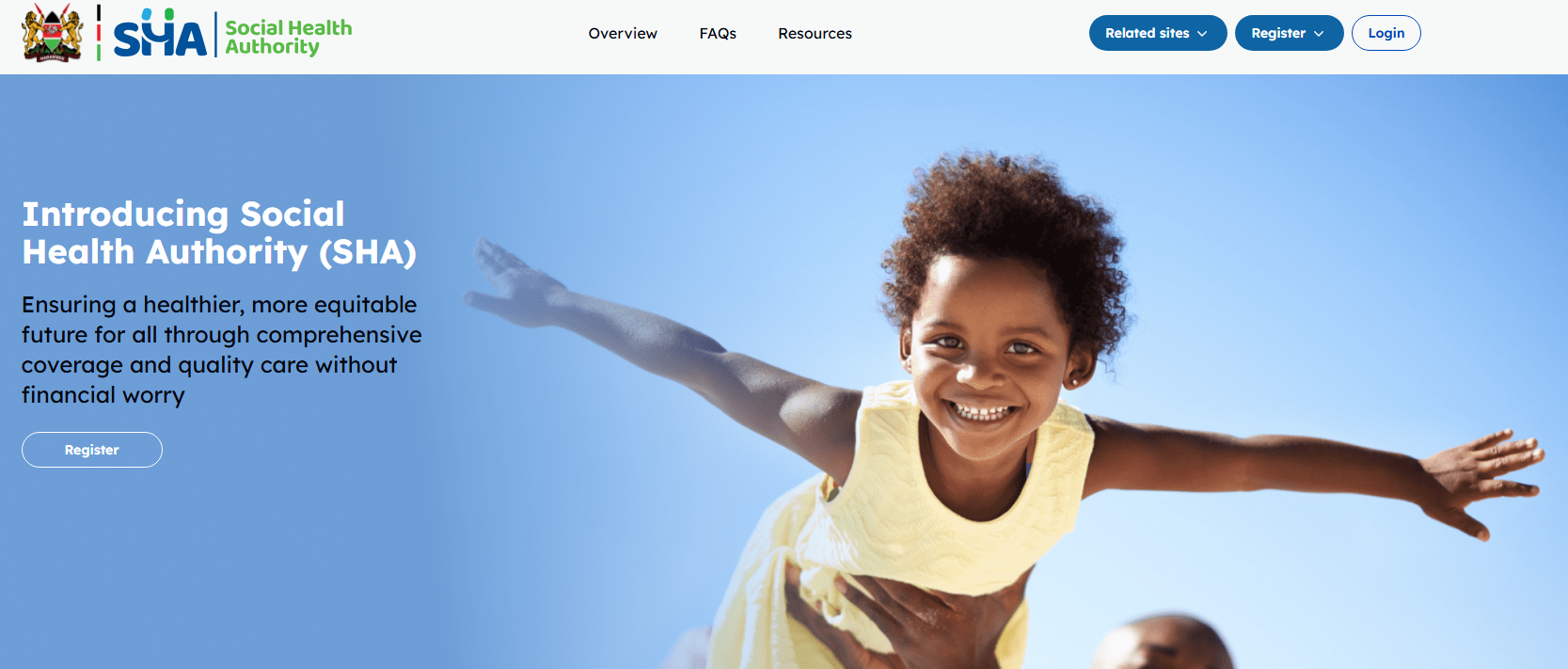What is SHA & Is It Active in Kenya?
The Social Health Authority, established by the Social Health Insurance Act, 2023, replaced NHIF. It started operations on October 1, 2024, managing Universal Health Coverage through three funds: Primary Healthcare, Social Health Insurance, and Emergency & Chronic Illness Fund.
SHA is very much active — the government aimed to register all Kenyans by December 2024, with nearly 60% already enrolled and over 7,000 health facilities linked health.go.ke.
SHA facilitates healthcare services from enlisted providers by pooling contributions—ensuring equitable distribution of quality healthcare.
The Social Health Authority is established under section 25 of the Act and is utilized to pool all contributions made under the Act.
SHA is designed to provide healthcare services from empaneled and contracted healthcare providers and healthcare facilities on referral from primary health facilities. The Social Health Authority ensures that every resident in Kenya can access a comprehensive range of quality health services they need without the burden of financial hardship.
How to Register – Step by Step
Individual Registration
You can register via:
-
USSD (for feature phones):
-
Dial
*147#, accept terms, enter your ID, name, county code, confirm.
-
-
Online (website or Afya Yangu):
-
Visit sha.go.ke or afyayangu.go.ke → Register → Enter ID/phone/email → OTP → PIN → Upload photo and fill details → Submit.
-
-
In-person:
Visit Huduma Centres or SHA branches. Provide ID, birth certificates for dependents, fill form, and do biometrics.
Employers register via the Employer Portal, upload business docs and employee details.
How to Log In
-
Go to sha.go.ke or afyayangu.go.ke.
-
Click “Login” (or “Employer Portal” for businesses).
-
Enter your National/Alien/Refugee ID and PIN or OTP.
-
You may receive an OTP for two-factor authentication.
-
Access your dashboard to view status, contributions, dependents, and Means Test .
If issues arise, reset your PIN, retry later, or contact 0800 720 601 or visit Huduma Centre.
SHA Rate for Employees & Employees vs. Self-Employed
-
Salaried employees: Deducted 2.75% of gross salary, shared between employer and employee.
-
Self-employed / informal sector:
-
Based on Means Test, as low as KSh 300/month for low-income earners, up to around KSh 880 on average.
-
How to Pay & Calculate
-
M-PESA (Paybill 200222, Account = your National ID), bank transfers, or payroll deduction.
-
After Means Test (via Afya Yangu), you’ll know your monthly contribution.
-
Employers automatically deduct 2.75% and remit by the 9th each month.
Penalties for Non-Payment
-
Non-payment may result in:
-
2% late penalty on the unpaid amount.
-
Fines up to KSh 2 million or 3 years imprisonment for employers.
-
Coverage suspension until contributions are settled.
-
Is SHA Mandatory?
Yes. It is compulsory for:
-
Kenyan citizens and lawful residents
-
Employers and their employees
-
Self-employed individuals within 90 days of enactment.
Non-compliance limits access to subsidized healthcare.

Coverage: Clinical Officers & Mental Health Nurses
There is no public data on number of registered clinical officers or mental health nurses under SHA. SHA accredits over 7,000 facilities, but staff counts aren’t listed.
For specifics, query the Ministry of Health or Kenya’s Clinical Officers Council and Nursing Council.
How to Get SHA
-
Register (USSD/online/in person).
-
Complete Means Testing (self-employed).
-
Pay your monthly fee.
-
Log in to view your SHA ID, contribution history, and benefits.
Challenges Facing SHA
-
System delays & unreimbursed claims – hospitals have turned away patients citing “system issues”
-
Limited reimbursement caps – hospitals report only ~KSh 900/day, forcing them to charge patients .
-
Uneven benefit matching – same benefit despite different contributions, complaints about outpatient exclusions .
-
Privacy concerns – SHA accesses many personal databases to adjust premiums, raising data privacy worries.
-
Complex bureaucracy & coverage gaps – mandated annual payments for self-employed, but inconsistent benefits; urban-rural inequality .
-
Public distrust – strong backlash citing corruption, profiteering, and ineffectiveness .
Summary Table
| Question | Answer |
|---|---|
| Registration | Via USSD, online portal, Huduma Centres |
| Login | sha.go.ke / afyayangu.go.ke with ID + PIN + OTP |
| Employee rate | 2.75% of gross salary |
| Self-employed | KSh 300–880 depending on Means Test |
| Penalty | 2% late fee; KSh 2 M fine or 3-year jail for employers |
| Compulsory? | Yes, for all citizens, residents, self-employed |
| SHA active? | Yes, fully operational since Oct 2024 |
| Clinical officers/nurses | Data not publicly available |
| Challenges | delayed claims, caps, low transparency, data privacy, public distrust |
SHA marks a bold move toward Universal Health Coverage in Kenya, but its rollout has hit bumps—especially in timely reimbursements, fairness, and service quality. Success hinges on resolving backend inefficiencies, strengthening data privacy, and rebuilding public trust. If you need healthcare coverage, register early, pay promptly, and explore complementary private insurance as backup given current system limitations.
